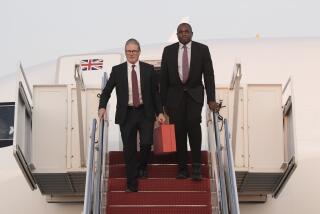U.S. Seeks to Curb Asian Missile Sales
- Share via
WASHINGTON — Concerned about the accelerating proliferation of short- and medium-range missiles to global hot spots, the Clinton administration is trying to apply new pressure to China and North Korea to curtail their missile exports.
Senior U.S. officials began two days of closed-door talks Friday in Beijing that were to focus, in part, on U.S. assertions that China is selling missile materials, components and expertise to Pakistan.
Separate U.S. talks with North Korea will take place Monday and Tuesday in Kuala Lumpur, Malaysia. The U.S. considers the North Korean regime the world’s worst perpetrator in missile proliferation, citing its sales to authoritarian regimes in Iran, Syria and Libya.
The talks with China, which will cover a broad range of arms control issues, are the first since November 1998. China suspended talks about six months later after U.S. warplanes mistakenly bombed the Chinese Embassy in Belgrade during the North Atlantic Treaty Organization air war against Yugoslavia.
Since then, U.S. officials say, Beijing has sold missile materials, components and expertise to Pakistan to help its longtime ally build a copy of China’s short-range, solid-fueled M-11 missile.
The U.S. has concluded that China first sold Pakistan parts and technology related to the M-11 missile in 1992.
The new aid has revived concern in Washington that Islamabad could use the Chinese-designed missile to fire a nuclear warhead at its longtime rival, India.
The missile “can carry a 500- or 700-kilogram [1,100- or 1,500-pound] payload, which is enough to carry a Pakistani nuclear weapon,” a senior U.S. official said. If launched near the border, he added, the M-11 “just barely makes New Delhi.”
So far, officials say, no evidence suggests that Pakistan has succeeded in adapting a nuclear warhead to the M-11 missile.
China insists that the missile’s range, about 180 miles, falls just under the bar set by the Missile Technology Control Regime, an international accord to limit exports of missile technology. China never signed the accord but pledged in 1994 to abide by its limits.
Philip T. Reeker, a State Department spokesman, said the administration is “concerned that China doesn’t exercise sufficient control of missile exports to Pakistan.”
But “we have no reason to conclude that they have acted in a manner inconsistent with their 1994 commitment,” Reeker said.
Analysts say China is determined to counter India’s domination of South Asia by promoting a nuclear balance of power. Both Pakistan and China see India as a military threat, and some experts say the Indians already have developed a missile-borne nuclear warhead. Senior U.S. officials view the subcontinent as a tinderbox that could easily explode into a nuclear exchange.
India tested a series of underground nuclear devices in May 1998, and Pakistan soon followed with underground tests of a Chinese-designed weapon obtained in the early 1980s.
In Kuala Lumpur, U.S. negotiators will resume long-stalled talks aimed at persuading North Korea to voluntarily curb missile development, tests, deployment and exports. Talks were last held in March 1999.
The Communist regime has exported medium-range Nodong missiles to Pakistan and Iran, sold short-range missiles to the United Arab Emirates and delivered components and materials to Egypt, Syria and Libya, according to U.S. officials.
North Korea also recently offered to sell short-range missiles to Sudan and Yemen, the officials say. In all, U.S. experts estimate that the trade is worth at least $100 million a year.
In previous talks, North Korea demanded $1 billion a year in compensation to stop selling missiles. Washington has refused to pay cash, but the administration has considered whether other inducements might be possible.
Ironically, recent signs that tensions are easing on the Korean peninsula might complicate the talks. The successful North-South Korean summit last month and the subsequent easing of U.S. trade sanctions are likely to lead to new economic benefits in the North. That in turn could reduce the Communist regime’s need to raise cash by bargaining away its missile exports.
More to Read
Sign up for Essential California
The most important California stories and recommendations in your inbox every morning.
You may occasionally receive promotional content from the Los Angeles Times.














